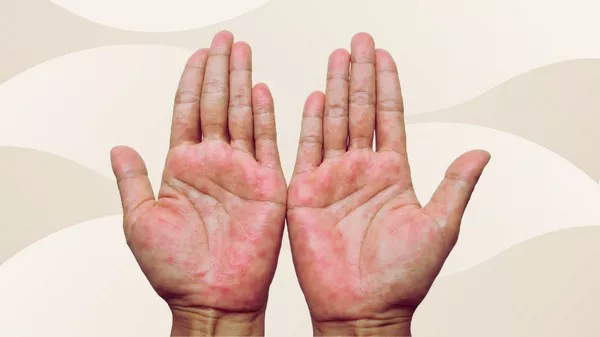Eczema, also known as atopic dermatitis, is a chronic inflammatory skin condition characterized by red, itchy, and dry patches. When these symptoms flare up on the hands, it can be particularly distressing and disruptive to daily life. The sensitive nature of hand eczema often makes it challenging to manage, requiring a combination of careful skincare, lifestyle adjustments, and sometimes medical treatments. This article aims to provide a comprehensive guide on how to effectively treat and alleviate eczema flare-ups on the hands.
Understanding Hand Eczema
Before diving into treatment strategies, it’s crucial to understand the underlying causes and triggers of hand eczema. Eczema is thought to be caused by a combination of genetic and environmental factors that disrupt the skin barrier, leading to inflammation and heightened sensitivity to irritants. Common triggers for eczema flare-ups on the hands include:
- Dryness: Low humidity levels or frequent hand washing can strip the skin of its natural oils, exacerbating eczema symptoms.
- Irritants: Exposure to harsh chemicals, detergents, solvents, and even certain fabrics can trigger or worsen eczema.
- Allergens: Contact with allergens such as nickel, rubber, fragrances, or certain foods can lead to flare-ups.
- Stress: Emotional stress or anxiety can weaken the immune system and exacerbate eczema symptoms.
- Weather: Cold, dry weather can aggravate eczema, while excessive sweating in hot weather can also trigger flare-ups.
Effective Treatment Approaches
Treating eczema on the hands requires a multifaceted approach that addresses both the symptoms and underlying triggers. The goal is to soothe the skin, repair the barrier function, and prevent future flare-ups. Here are several effective treatment strategies:
1. Moisturize Regularly
One of the most important steps in managing hand eczema is to keep the skin well moisturized. Moisturizers help to hydrate the skin, reduce dryness, and restore the skin barrier. Opt for thick, fragrance-free moisturizers or emollients that provide a protective layer without irritating the skin. Apply moisturizer liberally throughout the day, especially after washing hands or whenever the skin feels dry.
2. Avoid Irritants and Allergens
Identifying and avoiding triggers is essential in managing eczema. Use gentle, fragrance-free soaps and detergents for hand washing. Wear protective gloves when doing household chores or when in contact with potential irritants or allergens. Avoid wearing jewelry or using products that contain metals like nickel, which can trigger allergic reactions.
SEE ALSO: How to Treat Itchy Blisters on Feet
3. Practice Proper Hand Hygiene
While frequent hand washing is important for preventing infections, it can also exacerbate eczema symptoms due to water exposure and soap residues. Use lukewarm water and mild soap when washing hands, and pat them dry with a soft towel instead of rubbing. Apply moisturizer immediately after drying hands to lock in moisture.
4. Use Topical Steroids or Immunosuppressants
For moderate to severe flare-ups, topical corticosteroids are often prescribed to reduce inflammation and itching. These should be used under the guidance of a healthcare professional, as prolonged or improper use can lead to skin thinning or other side effects. In some cases, non-steroidal anti-inflammatory creams or calcineurin inhibitors may be prescribed to manage symptoms.
5. Try Wet Wrap Therapy
Wet wrap therapy can be effective for severe eczema flare-ups on the hands. After applying a moisturizer or topical medication, wrap the affected hands in damp, cool bandages or clothing. This helps to lock in moisture and enhance the absorption of medications, providing relief and promoting healing.
6. Manage Stress
Stress can significantly impact eczema symptoms. Practice stress-reducing techniques such as meditation, yoga, deep breathing exercises, or mindfulness to help manage stress levels and improve overall well-being. Counseling or therapy may also be beneficial for learning coping strategies.
7. Consider Phototherapy
In cases where other treatments have been ineffective, phototherapy (light therapy) may be recommended. This involves exposing the affected skin to controlled amounts of natural or artificial ultraviolet (UV) light under medical supervision. Phototherapy can help reduce inflammation and itching associated with eczema.
8. Maintain a Healthy Lifestyle
A healthy diet rich in vitamins, minerals, and essential fatty acids can support skin health and overall immune function. Stay hydrated by drinking plenty of water throughout the day. Avoid smoking and limit alcohol consumption, as these can worsen eczema symptoms.
When to Seek Medical Advice
While many cases of hand eczema can be managed with self-care and over-the-counter treatments, it’s important to consult a dermatologist or healthcare provider if:
- Symptoms worsen or do not improve with home treatments.
- There are signs of infection, such as increased redness, swelling, or pus.
- Eczema affects daily activities or sleep quality.
- You experience severe itching, pain, or discomfort.
A healthcare provider can prescribe stronger medications, perform allergy testing if necessary, and provide personalized advice on managing eczema flare-ups.
Conclusion
Managing eczema flare-ups on the hands requires patience, diligence, and a tailored approach to skincare and lifestyle adjustments. By identifying triggers, practicing proper skincare techniques, and using appropriate treatments, individuals can effectively alleviate symptoms and reduce the frequency of flare-ups. Remember that consistency is key in managing eczema, and seeking medical advice when needed ensures comprehensive care and support. With the right strategies and a proactive mindset, individuals can regain control over their eczema and enjoy healthier, more comfortable hands.
Related Topics:


























